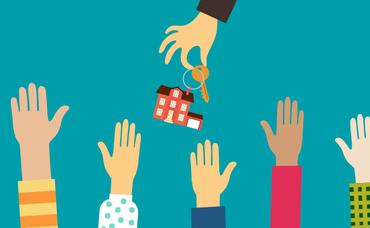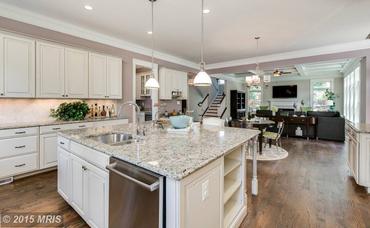Selling a home isn’t just about slapping down a fresh coat of paint—you need to delve into home buyers’ brains and figure out what makes them tick. From the moment they spot your listing to the instant they walk through your door, what persuades them to make an offer, and stick around to close the deal? To find out, we culled the most recent scientific studies that examine the home-buying mind to find out what turns it on—and off—and how you can use this information to your advantage.
Buyers know within seconds if they want a home
With a decision as weighty as a home purchase, one might think that buyers deliberate over all the pros and cons before they decide to sign on the dotted line. Yet studies show this is not the case.
According to the “Psychology of House Hunting” report by BMO Financial Group, 80% of prospective buyers know if a home is right for them within seconds of stepping inside. The reason? Researchers theorize that our minds process far more information in less time than we think, so a lengthy deliberation process may be a waste of time.
Take-home lesson: Since buyers know within seconds of entering your home whether it’s The One, you’ll want to spiff up the area they’ll see in that time frame—namely, your foyer.
“It can be a challenge to keep this area tidy since that’s where homeowners put their mail, keys, coats, shoes, dog leashes, and other items,” says Sissy Lappin, a real estate broker in Houston.
Containers are key for keeping this mess under control: baskets or racks for shoes, bowls for keys and change—and, unless you have a nearby closet, you can never have too many coat hooks. Be sure to stash any seldom-used items elsewhere. Anywhere else.
They find aromatherapy confusing
It’s not all about what home buyers see; what they smell matters, too. But that doesn’t mean you should fill your home with potpourri or freshly baked cookies.
These “complex” scents can actually backfire in homes, according to a study by Eric Spangenberg at Washington State University, who found that shoppers will spend 32% more in stores where he piped in a simple orange scent rather than a multifaceted blend of orange, basil, and green tea. The reason? Complex scents may be nice, but they’re also more distracting as people try to figure out what they are.
As Spangenberg explained to the Wall Street Journal, “They are not there to process the smells. They are there to process whether this is a place they want to live.”
Take-home lesson: If you go for a scent, keep it fresh and simple. Spangenberg recommends lemon, basil, or pine. You have no time to grab scented candles?
“As a quick fix, I splash Pine-Sol down the sink,” says Lappin. “While certain scents might appeal to one gender but turn off the other, everyone loves the smell of clean.”
They’re wary of the number 9 in a price
On just about any shopping spree, we’re wooed by “charm prices”—in other words, T-shirts or towels priced at $9.99 rather than a round $10—because consumers tend to think that prices ending in 9 are a way better deal. Only with big purchases like homes, charm pricing makes buyers wary.
According to a study by Old Dominion University, 9’s near the end of a home price—say, $199,000 versus $200,000—are a turnoff. Why? Because these homes appear to be trying too hard to look like a bargain, and buyers don’t like that whiff of desperation when it comes to such a big purchase.
Take-home lesson: Avoid 9’s near the end of your asking price, because buyers may have a knee-jerk impulse to turn away.
“Charm pricing may be fine for T-shirts, but it looks sleazy on a home,” Lappin says. “You feel like you need a shower after seeing the price.”
Prices with round numbers are a turnoff, too
Another number no-no? Pricing your home with round numbers with lots of zeroes, like $200,000, seems like you pulled this number out of a hat. A more specific number like $217,000, on the other hand, makes it look like you’ve really done your homework and know exactly what your home is worth.
One study by Columbia Business School found that negotiators who ask for specific amounts are more successful than those who make rounded offers.
Take-home lesson: Avoid the round number trap and make sure your asking price is specific.
“It will sound like you’ve run the numbers on your home, right down to the exact square footage,” says Lappin. “Oftentimes buyers will ask, ‘Where does this number come from?’ and I’ll say, ‘This seller has done their research and it will take an hour to explain it.’ That’s usually enough to convince them to fall in line.”
Buyers fall hard for staged homes
Staging a home to sell is all the rage these days, and research shows it works: A study by the Real Estate Staging Association looked at 63 unstaged homes that sat on the market for an average of 143 days. Once those houses were professionally staged, they sold, on average, 40 days after their makeover.
Take-home lesson: Pay attention to presentation. But you may not have to open your wallet for a professional stager; the basic premises are simple ones that anyone can put into practice. For one: If you’re already moved out, get some furniture back in the house.
“Seeing a house without furniture is like seeing someone naked in bright light: You can see all their flaws,” says Lappin. Or, if your home does have furniture, make sure it’s the right furniture for each room.
“If you turned your college kid’s bedroom into an office/workout room, change it back to a bedroom,” says Lappin. “I don’t care if it’s four-bedroom—if you only have a bed in one room, it will be perceived as a one-bedroom house. It may sound weird, but that’s how people think. They may say they have imaginations, but they really don’t. On a subliminal level, they take what they see to heart.”
—
If you’re planning on selling your current home, The Keri Shull Team is here for all your real estate needs. Work with a real estate team who has your best interests at heart and the skills to back up their guarantee. Call 703-952-7653 or email us at: [email protected]
[h/t] Realtor







